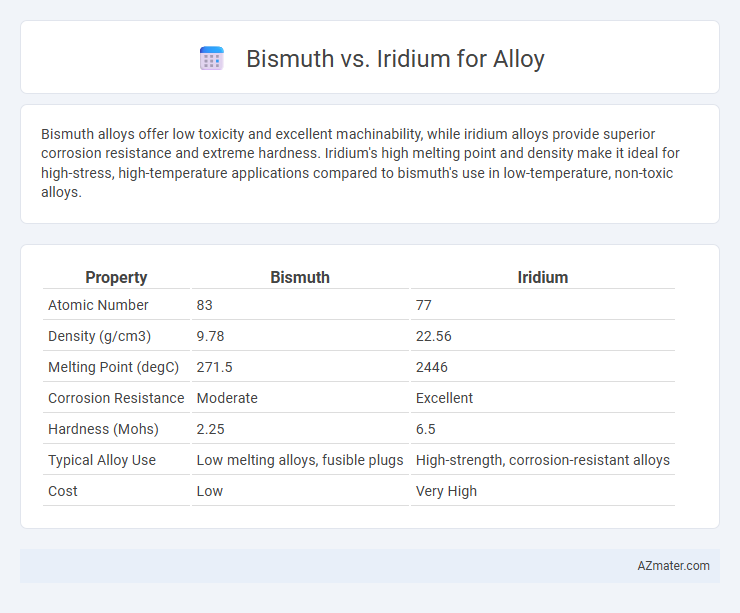Bismuth alloys offer low toxicity and excellent machinability, while iridium alloys provide superior corrosion resistance and extreme hardness. Iridium's high melting point and density make it ideal for high-stress, high-temperature applications compared to bismuth's use in low-temperature, non-toxic alloys.
Table of Comparison
| Property | Bismuth | Iridium |
|---|---|---|
| Atomic Number | 83 | 77 |
| Density (g/cm3) | 9.78 | 22.56 |
| Melting Point (degC) | 271.5 | 2446 |
| Corrosion Resistance | Moderate | Excellent |
| Hardness (Mohs) | 2.25 | 6.5 |
| Typical Alloy Use | Low melting alloys, fusible plugs | High-strength, corrosion-resistant alloys |
| Cost | Low | Very High |
Introduction: Bismuth and Iridium in Alloy Applications
Bismuth and iridium serve distinct roles in alloy applications due to their unique physical and chemical properties. Bismuth is valued for its low toxicity, high density, and excellent machinability, making it ideal for lead-free solders and low-melting alloys used in fire detection and metal casting. Iridium, with its exceptional corrosion resistance, high melting point, and hardness, is favored for strengthening high-performance alloys in aerospace, medical implants, and electrical contacts.
Chemical and Physical Properties Comparison
Bismuth and iridium exhibit distinct chemical and physical properties critical for alloy applications; bismuth has a low melting point of 271.5degC and is chemically stable with low toxicity, favoring alloys where melting temperature control and environmental safety are essential. Iridium boasts an exceptionally high melting point of 2446degC, remarkable corrosion resistance, and high density, making it suitable for high-strength, high-temperature alloys requiring durability and chemical inertness.
Alloying Behavior and Compatibility
Bismuth exhibits limited solubility and tends to segregate in Iridium alloys, causing brittleness and reduced mechanical strength. Iridium forms stable solid solutions with certain metals but shows poor compatibility with Bismuth due to differences in atomic size and crystal structure. Alloying behavior favors Iridium as a matrix for high-temperature applications, while Bismuth is primarily used as a low-melting additive, not forming homogeneous alloys with Iridium.
Mechanical Strength and Durability
Bismuth alloys typically exhibit lower mechanical strength and durability compared to iridium alloys, which are renowned for their exceptional hardness and resistance to wear. Iridium alloys provide superior tensile strength and corrosion resistance, making them ideal for high-stress and high-temperature applications. Due to bismuth's brittle nature, its alloys are mostly used where machinability and low toxicity are preferred over mechanical performance.
Corrosion and Oxidation Resistance
Bismuth alloys exhibit limited corrosion and oxidation resistance, often forming oxide layers that can degrade material performance in harsh environments. Iridium alloys are renowned for exceptional corrosion resistance and oxidation stability, maintaining integrity under extreme conditions due to the formation of a stable iridium oxide protective layer. For applications demanding superior durability against chemical and oxidative degradation, iridium alloys outperform bismuth-based alternatives significantly.
Cost and Availability of Bismuth vs Iridium
Bismuth is significantly more cost-effective than iridium, with prices per kilogram being hundreds of times lower due to its relative abundance and widespread mining. Iridium, one of the rarest and most valuable platinum-group metals, commands extremely high prices and limited availability, primarily sourced as a byproduct of nickel and platinum refining. The cost and scarcity of iridium restrict its large-scale alloy applications, while bismuth's ample supply and affordability make it a practical choice for cost-sensitive alloys.
Environmental and Health Considerations
Bismuth offers significant environmental benefits as it is non-toxic, biodegradable, and poses minimal health risks compared to iridium, which is a rare and expensive metal often associated with environmental challenges during mining and extraction. While iridium exhibits exceptional corrosion resistance and mechanical strength essential for high-performance alloys, its scarcity leads to high ecological footprints and potential exposure to hazardous processing chemicals. Bismuth's low toxicity and safe handling make it a preferred choice in environmentally sensitive applications, promoting sustainable alloy development without compromising human health.
Common Industrial Uses of Bismuth Alloys
Bismuth alloys are widely used in the manufacturing of low-melting-point applications such as fire detection and suppression systems, electrical fuses, and solders for electronics due to their non-toxic and environmentally friendly properties. Iridium, known for its exceptional hardness and corrosion resistance, is primarily used in high-temperature and wear-resistant applications, such as spark plugs and crucibles, but lacks the low melting point advantageous in bismuth alloys. The unique qualities of bismuth alloys make them ideal for precision casting and metal recycling processes, where ease of melting and safety are critical.
Common Industrial Uses of Iridium Alloys
Iridium alloys are commonly used in high-temperature applications such as crucibles for crystal growth, spark plugs, and electrical contacts due to their excellent corrosion resistance and high melting points. Bismuth, while useful as a low-melting alloy component and in fusible alloys for fire safety devices, lacks the extreme durability and thermal stability of iridium alloys. Industries often choose iridium alloys over bismuth for aerospace, electronics, and chemical processing equipment requiring long-lasting performance under harsh conditions.
Choosing the Right Alloy: Bismuth or Iridium?
Bismuth alloys offer low toxicity and excellent machinability, making them ideal for applications requiring environmental safety and ease of shaping, such as in cosmetics and medical devices. Iridium alloys provide exceptional hardness, high melting points, and corrosion resistance, suitable for high-temperature and wear-resistant components in aerospace and electronics. Selecting the right alloy depends on the application's demand for non-toxic properties and machinability versus extreme durability and thermal stability.

Infographic: Bismuth vs Iridium for Alloy
 azmater.com
azmater.com